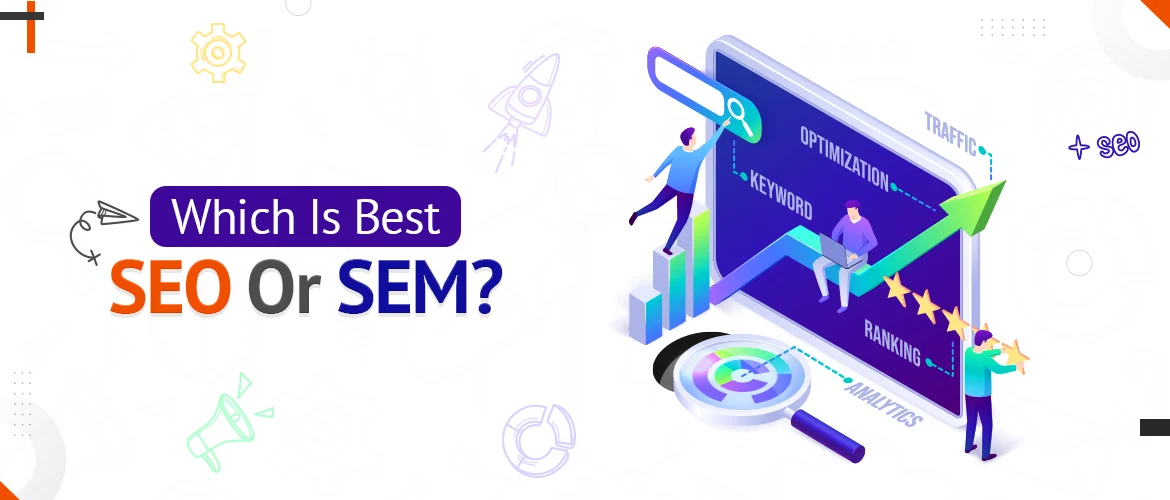In the ever-evolving realm of digital marketing, two prominent strategies have been vying for the top spot - Search Engine Optimization (SEO) and Search Engine Marketing (SEM). Both aim to enhance a website's visibility on search engine result pages (SERPs), driving organic and paid traffic respectively. But the question remains: Which is best, SEO or SEM? Let's delve into the intricacies of each approach to unravel this conundrum.
SEO - Building the Foundation for Organic Success:
Search Engine Optimization is an organic marketing tactic that focuses on improving a website's search engine ranking through various on-page and off-page optimization techniques. SEO aims to align your website with search engine algorithms and user intent to generate sustainable, long-term traffic without incurring direct costs per click.
Search Engine Optimization (SEO):
SEO is a set of techniques and practices aimed at optimizing websites to improve their organic rankings on search engine results. It focuses on enhancing the website's visibility through keyword optimization, content creation, backlink building, and technical optimizations. With SEO, the goal is to attract relevant organic traffic over the long term.
Search Engine Marketing (SEM):
SEM, on the other hand, involves paid advertising efforts to gain visibility on SERPs. This includes Pay-Per-Click (PPC) advertising, where businesses bid on relevant keywords and pay when users click on their ads. SEM also encompasses other forms of paid marketing, such as display ads, retargeting campaigns, and social media advertising. SEM offers immediate visibility and drives targeted traffic to your website.
Keyword Focus:
In the United States, businesses seeking search engine optimization services can benefit from local SEO agencies. These agencies provide tailored strategies to improve rankings for keywords like "Search Engine Optimization Services in USA." On the other hand, if a business wants to opt for paid advertising, they can explore "Search Engine Marketing Services in USA" to connect with SEM agencies.
Pros and Cons of SEO:
Long-term benefits: SEO efforts can provide sustainable results over time, as organic rankings improve and attract a steady flow of targeted traffic.
Cost-effective: While initial investments may be required, organic traffic generated through SEO does not incur ongoing costs per click.
Credibility and trust: High organic rankings often instill trust and credibility in users, leading to higher click-through rates.
Time-consuming: SEO can be a lengthy process, as it requires time to implement optimizations and wait for search engines to recognize and index changes.
High competition: Achieving top rankings for highly competitive keywords can be challenging and time-consuming, requiring continuous efforts and optimizations.
Pros and Cons of SEM:
Immediate results: Paid advertising through SEM provides instant visibility and immediate traffic to your website.
Targeted reach: SEM allows businesses to precisely target specific keywords, demographics, and geographic regions to reach their desired audience.
Scalability: SEM campaigns can be easily scaled up or down based on budget and performance.
Ongoing costs: SEM campaigns require continuous investment as businesses pay for each click or impression, making it potentially expensive in the long run.
Ad blindness: Users are becoming increasingly adept at identifying paid advertisements, resulting in lower click-through rates for ads compared to organic results.
The Symbiotic Relationship: SEO and SEM:
Rather than viewing SEO and SEM as competitors, smart digital marketers recognize their symbiotic potential. Integrating both strategies can yield exceptional results.
Keyword Insights: SEM campaigns can provide valuable data on which keywords drive the most traffic and conversions, aiding your SEO keyword strategy.
Boosting Click-Through Rates: Dominating both organic and paid search results for specific keywords can significantly increase click-through rates.
Seasonal Promotions: Utilize SEM for short-term promotions and SEO for long-term stability, creating a comprehensive marketing approach.
Conclusion:
Determining the best approach between SEO and SEM depends on your business goals, budget, and timeline. If you're looking for long-term sustainability, enhanced credibility, and cost-effectiveness, SEO may be your ideal choice. On the other hand, if immediate visibility, targeted reach, and flexibility in ad spend are paramount, SEM can provide the desired results.
Ultimately, a combination of both SEO and SEM can yield optimal results. Consider partnering with an affordable SEO company, such as Binary Digit, a top-tier software company and digital agency. Their expertise can guide you through the complexities of SEO and SEM, helping you develop a comprehensive digital marketing strategy to propel your business towards online success.
Remember, it's crucial to evaluate your specific business needs, conduct thorough research, and monitor the performance of your chosen strategy to make informed decisions that align with your goals and budget.


